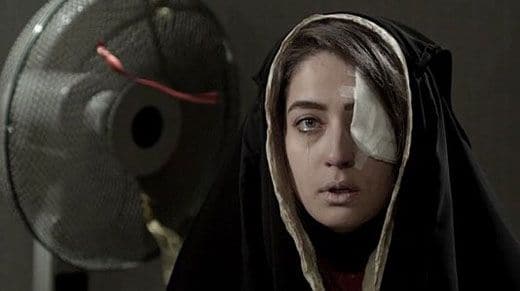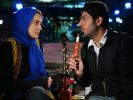Eye For Film >> Movies >> One.Two.One (2011) Film Review
One.Two.One
Reviewed by: David Graham

An experimental and theatrical mood piece, the latest film from one of the stars of Iranian hit Ten takes stylistic and thematic cues from that film but reins in the scope to focus on a group of people connected to one woman. That she's defiantly modern and refuses to be boxed into a corner is shown to be the root of many of the problems she contends with, from society's judgement to men's possessive attitudes. Director Mania Akbari keeps her camera uncomfortably close to her characters, only ever drifting a few feet from one to another as her 10-minute long dialogues play out in cleverly revealing fashion. While this bare-bones approach will prove un-stimulating for mainstream viewers, the tight script and convincing performances shed involving and memorable insight into the plight of this Persian woman.
A woman lies under a face-mask besides two others, their trivial chatter distracting her from the more serious preoccupations haunting her after having been facially disfigured. As she heals over the next short while, the people closest to her try to reconnect with her - sometimes with selfish motives - but the woman struggles to let anyone in, perhaps for fear of what might happen. Prospective suitors and well-meaning female friends come and go, but the woman wonders whether she can truly trust any of them, or can forgive those who have wronged her.

Touching on facts of Middle Eastern life that are uncomfortably alien to us in the West - from acid attacks to polygamy - this contemplative, thought-provoking film joins the likes of Persepolis in portraying female characters caught between tradition, religion and a progressive sense of their own self-worth. The circumstances surrounding the vignettes that form the story's structure are left deliberately ambiguous, the audience required to fill in the blanks in a way that staves off the potential boredom inherent in such a limited set-up.
Initial scenes offer an understanding of women of a variety of ages and personalities, their intimate banter in often public settings holding universal truths and conveying the preoccupations unique to their culture. As Akbari shifts her focus onto the men - especially with somber scenes set in a prison - we realise that even they have an awareness of their own wrong-doing towards their female counterparts, but are rendered near-helpless by frustration at their impotence in the face of woman's advancement. The regret of the woman's husband for his part in her accident is painfully tangible, and gives the film a balance a more feminist-leaning director might not have achieved.
The main character's acceptance of her fate and growing defiance at being pressured into relationships marks her out as an optimistic beacon for Persian women to follow suit, while even the men around her seem to learn a little from her example. Akbari winds things up on a poignantly bittersweet note, refusing to overplay her message for greater equality or sugar-coat her underlying hope for the future.
While the film is arguably too long at even 79 minutes, each episode stands on its own as a revealing whole, and contributes to the overview of modern Middle Eastern relationships. The air of sadness maintained by the disconnect between these characters is tempered by their growing respect for each other, impeccable acting fleshing them out with every line of the well-considered script. Akbari could perhaps have made her testimonials even more engaging through the use of more elaborate settings and a greater sense of realism, but her film stands as an illuminating experience and considerable achievement for Persian cinema.
Reviewed on: 03 Jul 2012



















